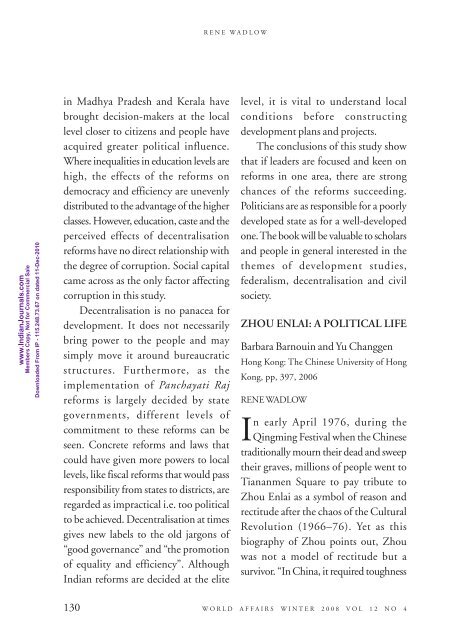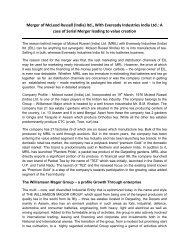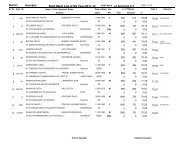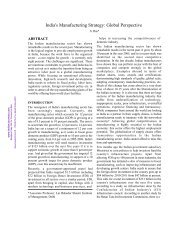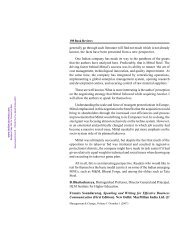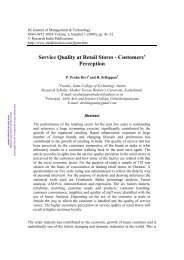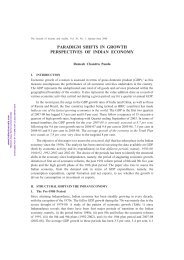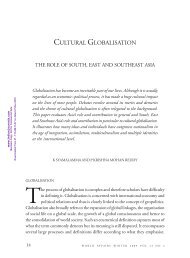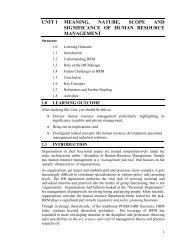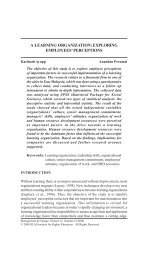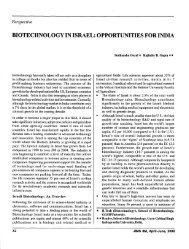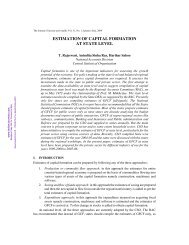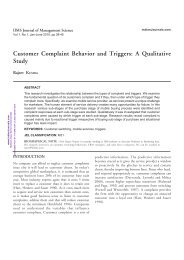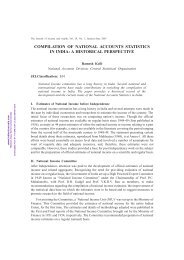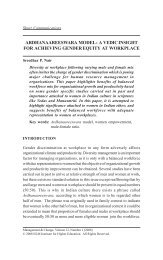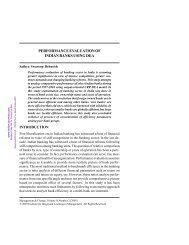Zhou Enlai - A Political Life.pdf - Mimts.org
Zhou Enlai - A Political Life.pdf - Mimts.org
Zhou Enlai - A Political Life.pdf - Mimts.org
You also want an ePaper? Increase the reach of your titles
YUMPU automatically turns print PDFs into web optimized ePapers that Google loves.
www.IndianJournals.com<br />
Members Copy, Not for Commercial Sale<br />
Downloaded From IP - 115.248.73.67 on dated 11-Dec-2010<br />
in Madhya Pradesh and Kerala have<br />
brought decision-makers at the local<br />
level closer to citizens and people have<br />
acquired greater political influence.<br />
Where inequalities in education levels are<br />
high, the effects of the reforms on<br />
democracy and efficiency are unevenly<br />
distributed to the advantage of the higher<br />
classes. However, education, caste and the<br />
perceived effects of decentralisation<br />
reforms have no direct relationship with<br />
the degree of corruption. Social capital<br />
came across as the only factor affecting<br />
corruption in this study.<br />
Decentralisation is no panacea for<br />
development. It does not necessarily<br />
bring power to the people and may<br />
simply move it around bureaucratic<br />
structures. Furthermore, as the<br />
implementation of Panchayati Raj<br />
reforms is largely decided by state<br />
governments, different levels of<br />
commitment to these reforms can be<br />
seen. Concrete reforms and laws that<br />
could have given more powers to local<br />
levels, like fiscal reforms that would pass<br />
responsibility from states to districts, are<br />
regarded as impractical i.e. too political<br />
to be achieved. Decentralisation at times<br />
gives new labels to the old jargons of<br />
“good governance” and “the promotion<br />
of equality and efficiency”. Although<br />
Indian reforms are decided at the elite<br />
130<br />
RENE WADLOW<br />
level, it is vital to understand local<br />
conditions before constructing<br />
development plans and projects.<br />
The conclusions of this study show<br />
that if leaders are focused and keen on<br />
reforms in one area, there are strong<br />
chances of the reforms succeeding.<br />
Politicians are as responsible for a poorly<br />
developed state as for a well-developed<br />
one. The book will be valuable to scholars<br />
and people in general interested in the<br />
themes of development studies,<br />
federalism, decentralisation and civil<br />
society.<br />
ZHOU ENLAI: A POLITICAL LIFE<br />
Barbara Barnouin and Yu Changgen<br />
Hong Kong: The Chinese University of Hong<br />
Kong, pp, 397, 2006<br />
RENE WADLOW<br />
In early April 1976, during the<br />
Qingming Festival when the Chinese<br />
traditionally mourn their dead and sweep<br />
their graves, millions of people went to<br />
Tiananmen Square to pay tribute to<br />
<strong>Zhou</strong> <strong>Enlai</strong> as a symbol of reason and<br />
rectitude after the chaos of the Cultural<br />
Revolution (1966–76). Yet as this<br />
biography of <strong>Zhou</strong> points out, <strong>Zhou</strong><br />
was not a model of rectitude but a<br />
survivor. “In China, it required toughness<br />
WORLD AFFAIRS WINTER 2008 VOL 12 NO 4
www.IndianJournals.com<br />
Members Copy, Not for Commercial Sale<br />
Downloaded From IP - 115.248.73.67 on dated 11-Dec-2010<br />
and ruthlessness to outlast, for more than<br />
half a century, the incessant infighting<br />
that was endemic in the Chinese<br />
Communist Party. To hold the post of<br />
prime minister for twenty-six years,<br />
working under the command of one of<br />
the most powerful, capricious and<br />
distrustful emperors in Chinese history,<br />
called for adroitness, adaptability and the<br />
capacity for shaping his positions<br />
according to the political winds,<br />
notwithstanding his own convictions”.<br />
<strong>Zhou</strong> <strong>Enlai</strong> and Mao Zedong in<br />
many ways became a single soul in two<br />
bodies during the conflicts against the<br />
Nationalist Government of Chiang Kaishek<br />
and the Japanese. Mao knew that<br />
he needed a skilled administrator and a<br />
subtle diplomat to meet with<br />
foreigners—skills which he himself did<br />
not have. Although Mao eliminated all<br />
those who had worked with him during<br />
the early years, <strong>Zhou</strong> <strong>Enlai</strong> was with him<br />
until the end. Both men died in 1976,<br />
as if the soul of one could not exist<br />
without the other—a rare blending of<br />
destinies. Stalin, with whom both <strong>Zhou</strong><br />
and Mao dealt with before coming to<br />
power and again after the Communist<br />
Government took over in China, had<br />
no such agent of his will. Stalin ruled<br />
alone, destroying one after the other all<br />
those around him. Mao always had a<br />
REVIEWS<br />
faithful echo of his views in <strong>Zhou</strong>, even<br />
though Mao changed his views often,<br />
driven by myths rather than an overall<br />
view of the facts.<br />
Mao and <strong>Zhou</strong> were very different<br />
people and only the possibility of a soul<br />
embodied in two bodies gives some<br />
feeling for the way the two stayed<br />
together. <strong>Zhou</strong> came from a Mandarin<br />
family, highly educated but not wealthy<br />
or powerful. As <strong>Zhou</strong>’s father was often<br />
away seeking government jobs, <strong>Zhou</strong><br />
was raised by his aunt in his grandfather’s<br />
book-filled home. <strong>Zhou</strong> learned to read<br />
early and became knowledgeable about<br />
classical Chinese thought. As there were<br />
many children in <strong>Zhou</strong>’s extended<br />
family, the clan had its own family<br />
school, which stressed Confucian values<br />
and the concept of self-cultivation. In<br />
the Confucian tradition, the first task of<br />
a learned person is to establish order and<br />
harmony and to serve his country and<br />
its people. The other Confucian value<br />
<strong>Zhou</strong> learned young was the golden<br />
mean—the avoidance of excess as<br />
expressed in a Confucian maxim “to go<br />
beyond is as wrong as to fall short”.<br />
Although he was a party to all the excesses<br />
of his government, the idea of<br />
Confucian moderation stayed with him.<br />
Thus, there is a certain irony in that late<br />
in his life, during the Cultural<br />
VOL 12 NO 4 WINTER 2008 WORLD AFFAIRS 131
www.IndianJournals.com<br />
Members Copy, Not for Commercial Sale<br />
Downloaded From IP - 115.248.73.67 on dated 11-Dec-2010<br />
Revolution when attacks on Confucian<br />
thought were expressions of official<br />
policy, <strong>Zhou</strong>’s enemies, unable to attack<br />
him directly, associated his name with<br />
the Duke of <strong>Zhou</strong>, a famous civil servant<br />
of an early emperor.<br />
After his home school, when he was<br />
twelve, <strong>Zhou</strong> joined a public school,<br />
living with his uncle in Mukden, then<br />
the capital of Manchuria. As Manchuria<br />
was a meeting point of cultures, his<br />
teachers introduced him to the<br />
intellectual debates of the time<br />
concerning patriotism, democracy and<br />
reforms influenced by Japan and the<br />
West. When his uncle was transferred to<br />
Tianjin, <strong>Zhou</strong> went to one of the most<br />
progressive schools in China, the Nankai<br />
Middle School, influenced by English<br />
education with strict discipline, sports<br />
and intellectual debate. <strong>Zhou</strong> became the<br />
editor of the school journal—starting a<br />
life-long interest in writing and drama.<br />
<strong>Zhou</strong> then attended Tianjin<br />
University, but already political debate<br />
and agitation took a larger place than his<br />
studies. This was the time of the “May<br />
Fourth Movement” of 1919—a high<br />
point of intellectual political activity<br />
against the Chinese Government and its<br />
acceptance of the Versailles Treaty that<br />
allowed the Japanese to annex parts of<br />
China. The movement, however, soon<br />
132<br />
RENE WADLOW<br />
grew to include opposition to<br />
Confucianism and traditional thought.<br />
Among the student leaders was Deng<br />
Yingchoa, <strong>Zhou</strong>’s future wife. <strong>Zhou</strong>’s<br />
student politics did not prevent him<br />
from getting a government scholarship<br />
to study in Europe and in 1920, he left<br />
China first to visit England and then to<br />
study in France.<br />
In France, <strong>Zhou</strong> became involved in<br />
the debates in French intellectual circles<br />
concerning socialism and the Russian<br />
Revolution. He came to feel that<br />
Communism was “the wave of the<br />
future” and with a few Chinese students<br />
in France, <strong>org</strong>anised the Chinese Youth<br />
Communist Party in Europe even before<br />
a Communist Party was officially<br />
<strong>org</strong>anised in China. Among the student<br />
leaders in France was Deng Xiaoping,<br />
who became a key figure after the death<br />
of Mao. There were others as well who<br />
would later become important leaders<br />
of the party in China. Thus, <strong>Zhou</strong><br />
established a network of relationships in<br />
Europe upon which he would draw for<br />
the rest of his life. <strong>Zhou</strong> lived in France<br />
for four years and became knowledgeable<br />
the Western world, which served him<br />
later in his diplomatic activities.<br />
The subtitle of Barbara Barnouin’s<br />
and Yu Changgen’s deeply researched<br />
book A <strong>Political</strong> <strong>Life</strong> is unnecessary.<br />
WORLD AFFAIRS WINTER 2008 VOL 12 NO 4
www.IndianJournals.com<br />
Members Copy, Not for Commercial Sale<br />
Downloaded From IP - 115.248.73.67 on dated 11-Dec-2010<br />
<strong>Zhou</strong> only had a political life, if one<br />
considers war making and espionage as<br />
politics by other means. From his return<br />
to China in 1924 until his death, <strong>Zhou</strong><br />
was in an endless series of adventures—<br />
military, diplomatic, administrative and<br />
internal party politics. He had no<br />
children and although his wife stayed<br />
with him to the end, there must have<br />
been little time for family life. <strong>Zhou</strong> had<br />
many co-workers, but, it would seem<br />
no friends. Those he had, he sacrificed<br />
when the political winds changed. His<br />
charming personality, intelligence and<br />
eloquence allowed him to be in contact<br />
with many different people and it was<br />
as a diplomat dealing with the Russians,<br />
Americans, French, Central Europeans,<br />
Indians, Koreans and Vietnamese that he<br />
made his mark.<br />
It was probably in 1943 that <strong>Zhou</strong><br />
and Mao’s souls merged and animated<br />
two bodies. It was in that year that the<br />
doctrine “Mao Zedong Thought (which)<br />
is Marxism–Leninism, Chinese<br />
Bolshevism and Chinese Communism”<br />
all at once was enshrined as the sacred<br />
creed and guiding principle for the entire<br />
party. From 1943 onwards, many crucial<br />
events took place—the war against the<br />
Japanese, the Chinese Civil War and the<br />
establishment of the Peoples’ Republic,<br />
REVIEWS<br />
the war in Korea, the break with post-<br />
Stalin Russia, the rise of the Non-Aligned<br />
Movement, the war in Vietnam, the reestablishment<br />
of relations with the USA<br />
and the Cultural Revolution—in which<br />
<strong>Zhou</strong> <strong>Enlai</strong> played an important role. Yet<br />
whoever <strong>Zhou</strong> <strong>Enlai</strong> was before 1943,<br />
afterwards his personality and individual<br />
goals were largely absent. He became the<br />
administrator of the Mao Zedong<br />
Thought. <strong>Zhou</strong> often had doubts about<br />
Mao’s aims and methods, most strongly<br />
during the Cultural Revolution. Yet,<br />
every time, when speaking out might<br />
have made a difference in favour of a<br />
more rational policy, <strong>Zhou</strong> <strong>Enlai</strong> was<br />
silent. He was willing to write elegant<br />
self-criticisms of himself and turn away<br />
from colleagues or staff who were in<br />
political trouble. As the authors evaluate,<br />
“<strong>Political</strong> survival clearly required <strong>Zhou</strong><br />
to faithfully execute Mao’s arbitrary<br />
instructions. For this he had not much<br />
choice, any defiance by him would have<br />
unavoidably resulted in his downfall,<br />
since an array of radicals was closely<br />
watching him and waiting for him to<br />
take a false step to oust him from<br />
power”. On his tomb, in those postersize<br />
characters of the Cultural<br />
Revolution, there should be only one<br />
word, “survivor”.<br />
VOL 12 NO 4 WINTER 2008 WORLD AFFAIRS 133


